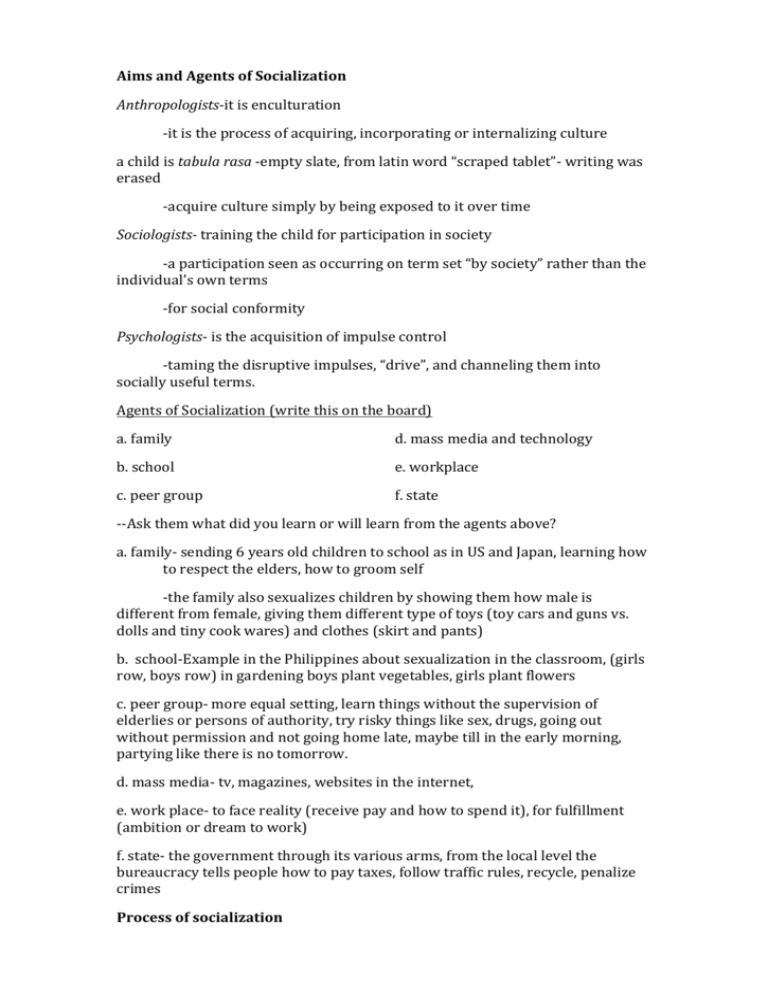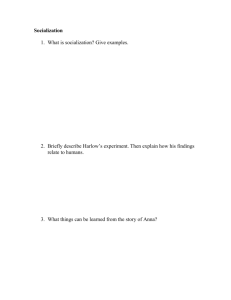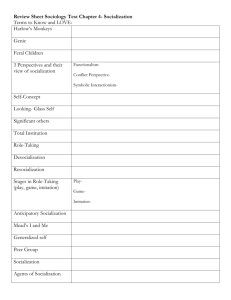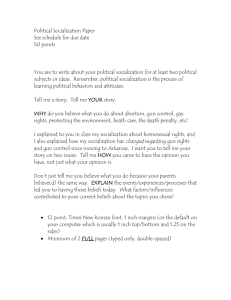Aims and Agents of Socialization Anthropologists
advertisement

Aims and Agents of Socialization Anthropologists-­‐it is enculturation -­‐it is the process of acquiring, incorporating or internalizing culture a child is tabula rasa -­‐empty slate, from latin word “scraped tablet”-­‐ writing was erased -­‐acquire culture simply by being exposed to it over time Sociologists-­‐ training the child for participation in society -­‐a participation seen as occurring on term set “by society” rather than the individual’s own terms -­‐for social conformity Psychologists-­‐ is the acquisition of impulse control -­‐taming the disruptive impulses, “drive”, and channeling them into socially useful terms. Agents of Socialization (write this on the board) a. family d. mass media and technology b. school e. workplace c. peer group f. state -­‐-­‐Ask them what did you learn or will learn from the agents above? a. family-­‐ sending 6 years old children to school as in US and Japan, learning how to respect the elders, how to groom self -­‐the family also sexualizes children by showing them how male is different from female, giving them different type of toys (toy cars and guns vs. dolls and tiny cook wares) and clothes (skirt and pants) b. school-­‐Example in the Philippines about sexualization in the classroom, (girls row, boys row) in gardening boys plant vegetables, girls plant flowers c. peer group-­‐ more equal setting, learn things without the supervision of elderlies or persons of authority, try risky things like sex, drugs, going out without permission and not going home late, maybe till in the early morning, partying like there is no tomorrow. d. mass media-­‐ tv, magazines, websites in the internet, e. work place-­‐ to face reality (receive pay and how to spend it), for fulfillment (ambition or dream to work) f. state-­‐ the government through its various arms, from the local level the bureaucracy tells people how to pay taxes, follow traffic rules, recycle, penalize crimes Process of socialization -­‐different types occur over the lifecycle of a person -­‐when does socialization start and end? 1. primary socialization-­‐language and cognitive skills Ex. Learning how to speak properly, politely 2. anticipatory socialization-­‐anticipates students role in their occupational area Ex. Internships 3. developmental socialization-­‐based on the achievement of primary socialization, addition of new learning in marriage, Ex. Improving language skills, 4. reverse socialization-­‐youngsters teaching adult Ex. (what do example of skills or tricks to you teach your elder brothers/sisters, mother or father, 5. resocialization-­‐ involves breaking sharply from the past and the internalization of a radically different norm Ex. Brainwashing/ shifting religion. Effects of Socialization Theories in the process of socialization 1. behaviorist approach-­‐ all learning takes place as a result of conditioning through rewards and punishments. (Pavlov experiment) 2. developmental-­‐more emphasis on the individual’s internal interpretation of situations, rather than external factors like reward and punishment. (Jean Piaget) -­‐you can’t teach a little boy a foreign language through reward and punishment, learning come in stages Self To the society-­‐conformity, continuity, multiplication of social roles, norms and functions On the Self -­‐self as a product of nature and nurture. (study of identical twins who were separated at birth, similarities in gestures), showed that even if they were socialized in different environment they still inherit some of their characteristics from their parents Self as the core of personality-­‐what makes up ths? Self Theories Freud’s Theory (1858-­‐1939)-­‐motive of human behavior are unconscious -­‐we are not always aware of the real motivations for our actions -­‐our past our dreams (repository of the unconscious-­‐desires, longings, fear) unconscious-­‐mental state of being which accounts for things not present to the mind at any given time but occurred in the mind in the past, mental storehouse conscious-­‐state of the mind that you are fully aware of. Pre-­‐conscious-­‐ sensory input that you can be aware of when the light of awareness is shone to it, like if you are in a coma or when you were injected an anesthesia, Man’s relationship with society is essentially in conflict-­‐ man are born with basic drive and instinct which they control/tame to live with others in a society Sex as an instinct that is essential for survival-­‐we risk a lot for it, go to war, violate laws, and confront illness. Libido—psychic energy, the motive force that powers all our thoughts, feelings and behaviors-­‐-­‐-­‐ build-­‐up will create painful drive-­‐satisfy by sensory pleasure, repression-­‐lead to painful tension and anxiety






